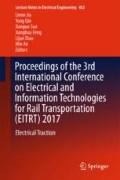Abstract
In the hybrid power system, the bidirectional DC/DC converter, as the driving devices for energy storage element, is the core element of hybrid energy storage system and has the function of stabilizing the intermediate DC link voltage. This paper introduces the working principle and the derivation of bidirectional Buck/Boost converter in the process of modeling. A voltage and current double closed loop control system based on load current prediction is designed. When the load changes constantly, the response speed of the system can be improved. Simulation studies using MATLAB/Simulink show that the established model and control strategy can be used for further research.
Access this chapter
Tax calculation will be finalised at checkout
Purchases are for personal use only
References
Zhang F, Zhu C, Yan Y (2005) The controlled model of bi-directional DC-DC converter. In: Proceedings of the CSEE Uo25 No.l l Jun. 2005. (in Chinese)
Gong J, Liu W, Xie S (2010) Modeling and simulation of bi directional DC DC power converter. Comput Simul 27(10):263–267 (in Chinese)
Xin C (2009) Modeling and simulation of nonideal DC–DC converters. Hefei Polytechnic University. https://doi.org/10.7666/d.y1509101. (in Chinese)
Xu H (2005) Research on topology and analysis theory of high power bi-directional DC-DC converter. Institute of electrical engineering, Chinese Academy of Sciences, 2005. (in Chinese)
Zhang F, Zhu C, Yan Y (2005) Control model of bi-directional DC-DC converter. Proc Chin Soc Electr Eng, 25(11):46–49. (in Chinese)
Vazquez N, Alvarez J, Aguilar C et al (1998) Some critical aspects in sliding mode control design for the Boost inverter. Power Electron Congr, 76–81
Pinheiro H, Martins A, Pinheiro J (1993) Single-phase voltage inverters controlled by sliding mode. In: Brazilian automation control conf, 1177–1182
Luo Y (2005) Study on bi-directional DC/DC converter and battery energy management system. Huazhong University of Science and Technology, 2013 25(11):46–49, https://doi.org/10.7666/d.D410662 (in Chinese)
Diaz J, Martin-Ramos JA, Prieto MJ (2004) A double-closed loop DC/DC converter based on a piezoelectric transformer. Appl Power Electron Conf Exposition, 2004(3):1423–1428
Acknowledgements
This work was supported by the China National Science and Technology Support Program under Grant 2016YFB1200504-C-01, Beijing major science and technology project under Grant Z171100002117011.
Author information
Authors and Affiliations
Corresponding author
Editor information
Editors and Affiliations
Rights and permissions
Copyright information
© 2018 Springer Nature Singapore Pte Ltd.
About this paper
Cite this paper
Liu, G., Ji, Z., Qiu, R., Wang, X. (2018). The Research on Bi-Directional DC/DC Converter for Hybrid Power System. In: Jia, L., Qin, Y., Suo, J., Feng, J., Diao, L., An, M. (eds) Proceedings of the 3rd International Conference on Electrical and Information Technologies for Rail Transportation (EITRT) 2017. EITRT 2017. Lecture Notes in Electrical Engineering, vol 482. Springer, Singapore. https://doi.org/10.1007/978-981-10-7986-3_43
Download citation
DOI: https://doi.org/10.1007/978-981-10-7986-3_43
Published:
Publisher Name: Springer, Singapore
Print ISBN: 978-981-10-7985-6
Online ISBN: 978-981-10-7986-3
eBook Packages: EnergyEnergy (R0)

